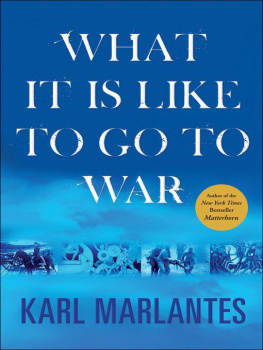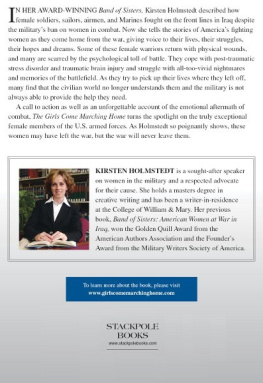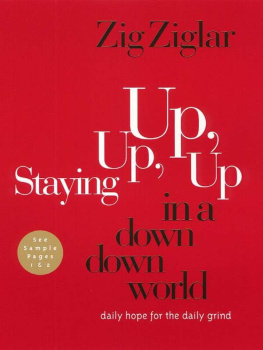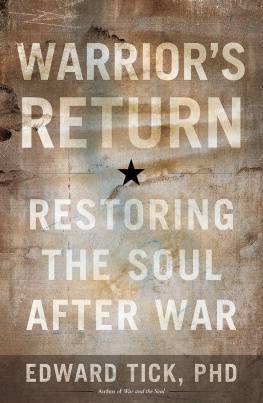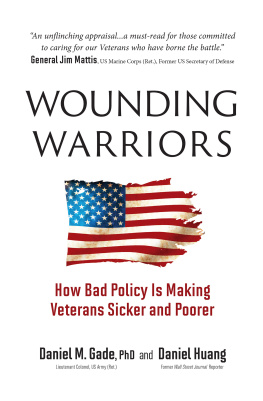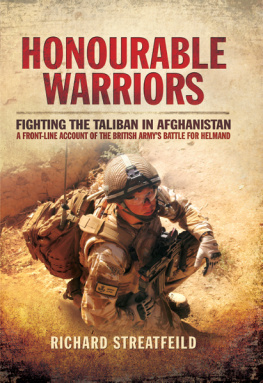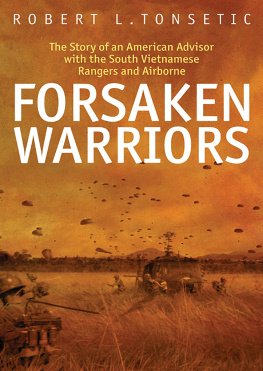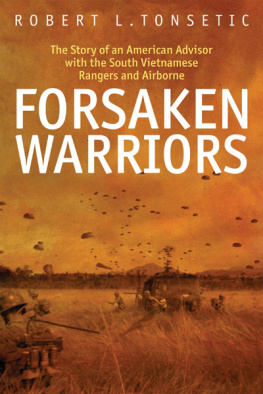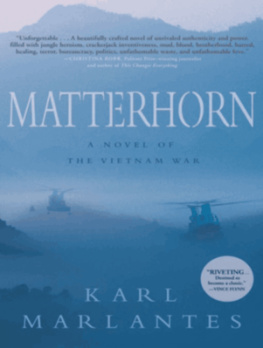
WHAT IT IS LIKE TO GO TO WAR
A LSO BY K ARL M ARLANTES
Matterhorn
WHAT IT IS LIKE TO GO TO WAR
KARL MARLANTES

Copyright 2011 by Karl Marlantes
All rights reserved. No part of this book may be reproduced in any form or by any electronic or mechanical means, including information storage and retrieval systems, without permission in writing from the publisher, except by a reviewer, who may quote brief passages in a review. Scanning, uploading, and electronic distribution of this book or the facilitation of such without the permission of the publisher is prohibited. Please purchase only authorized electronic editions, and do not participate in or encourage electronic piracy of copyrighted materials. Your support of the authors rights is appreciated. Any member of educational institutions wishing to photocopy part or all of the work for classroom use, or anthology, should send inquiries to Grove/Atlantic, Inc., 841 Broadway, New York, NY 10003 or permissions@groveatlantic.com.
Excerpt from Seven Pillars of Wisdom by T. E. Lawrence, copyright 1926, 1935 by Doubleday, a division of Random House, Inc. Used by permission of Doubleday, a division of Random House, Inc.
Excerpt from The Collected Works of W.B. Yeats, Volume I: The Poems, Revised by W. B. Yeats, edited by Richard J. Finneran. Copyright 1940 by Georgie Yeats, renewed 1968 by Bertha Georgie Yeats, Michael Yeats, and Anne Yeats. All rights reserved. Reprinted with the permission of Scribner, a Division of Simon & Schuster, Inc.
Excerpt from Egils Saga reprinted by permission of Everymans Library, London.
Excerpt from The Mahabharata reprinted by permission of Bharatiya Vidya Bhavan.
Almost all call signs, names, nicknames, and their origins have been changed to protect the privacy of the individuals and their families.
Printed in the United States of America
Published simultaneously in Canada
eBook ISBN-13: 978-0-8021-9514-2
Atlantic Monthly Press
an imprint of Grove/Atlantic, Inc.
841 Broadway
New York, NY 10003
Distributed by Publishers Group West
www.groveatlantic.com
11 12 13 14 15 10 9 8 7 6 5 4 3 2 1
The nation that makes a great distinction between its scholars and its warriors will have its thinking done by cowards and its fighting done by fools.
Spartan king, quoted by Thucydides
Any fool can learn from his mistakes. The wise man learns from the mistakes of others.
Otto von Bismarck
This book is dedicated to the Marines I served with in Vietnam, those who came home and those who didnt, and to all combat veterans who fought and are fighting now with noble heartsall.
CONTENTS
1
Temple of Mars
2
Killing
3
Guilt
4
Numbness and Violence
5
The Enemy Within
6
Lying
7
Loyalty
8
Heroism
9
Home
10
The Club
11
Relating to Mars
PREFACE
I wrote this book primarily to come to terms with my own experience of combat. So farreading, writing, thinkingthat has taken more than forty years. I could have kept my thoughts in a personal journal, but I took on trying to get these reflections published so that I could share them with other combat veterans. Perhaps, in some way, I can help them with their own quest for meaning and their efforts to integrate their combat experiences into their current lives. I also want to share my thoughts and experiences with young people who are contemplating joining the military or who are about to enter combat themselves, sort of like providing them with a psychological and spiritual combat prophylactic, for indeed combat is like unsafe sex in that its a major thrill with possible horrible consequences. Finally, this nation is now engaged in three wars simultaneously, two with both air and ground forces and one from the air only. I am quite certain these are not the last. All conscientious citizens and especially those with the power to make policy will be better prepared to make decisions about committing young people to combat if they know what they are about to ask of them.
The violence of combat assaults psyches, confuses ethics, and tests souls. This is not only a result of the violence suffered. It is also a result of the violence inflicted. Warriors suffer from wounds to their bodies, to be sure, but because they are involved in killing people they also suffer from their compromises with, or outright violations of, the moral norms of society and religion. These compromises and violations are not generally discussed and their impact on a warriors mental health and soul is minimized or even ignored entirely, not only by current military training but by society at large.
The book is not intended to fix or improve military training. I was a U.S. Marine in the Vietnam War and believe that the Marine Corps prepared me then, and still does prepare our young Marines, to fight our countrys battles exceedingly well, as do all the other branches of the United States military. In fact, todays young warriors are far better prepared than we were in the Vietnam era, at least technically and tactically. This book, rather, focuses on those aspects of combat that cant adequately be prepared for by institutional training programs, no matter how lengthy or thorough. The preparation for these aspects of combat must be done by the individual, in the quiet places, alone, in communion with his or her own heart and soul. It would probably be better if such soul-searching were done before an individual volunteers for military service, but I am well aware that eighteen-year-olds are not known for introspection. This is one of many reasons why young people, particularly young men, make the best warriors. However, imminent maiming and death do help motivate young warriors to contemplate these more serious aspects of their profession. So if by reading this book before entering combat a young warrior can be helped to better handle the many psychological, moral, and spiritual stresses of combat, then the book will have been worth writing. In addition, if the ideas discussed here help citizens and policy makers attain a clearer understanding of what they are asking of their warriors and of their own role in sending them into the moral quagmire and sacrificial fire called war, then the book will have succeeded, if not beyond my hopes, perhaps beyond my expectations.
1
TEMPLE OF MARS
Warriors deal with death. They take life away from others. This is normally the role of God. Asking young warriors to take on that role without adequate psychological and spiritual preparation can lead to damaging consequences. It can also lead to killing and the infliction of pain in excess of what is required to accomplish the mission. If warriors are returned home having had better psychological and spiritual preparation, they will integrate into civilian life faster and they and their families will suffer less. But the more blurred the boundary is between the world where they are acting in the role of God and the world where they are acting in an ordinary societal role, the more problematical the reintegration becomes.

